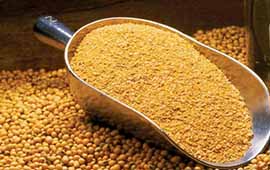One of the products that is obtained during the production of soybean oil is meal.
Soybean meal contains many useful substances, as well as amino acids and proteins necessary for the growth and development of animals, and it is often made one of the components of animal feed. It is believed that it is the meal that is the highest quality product for feeding farm animals, which helps them gain the necessary mass faster.

That is why this product, along with soybean oil and seeds, is actively supplied to other countries, and especially to the EU countries.
What is needed for the supply of soybean meal to the EU
Soybean meal is actively purchased by Europe, which is in the first place in the import of this product worldwide. At the same time, in 2020, according to statistics, the EU purchased 40% less soybean meal than a year earlier. As expected, purchases of soybean seeds have also declined – this is due to both political and economic reasons. In particular, the main exporters of soybeans – Brazil and Argentina – set insufficiently attractive prices for this product, and the drought did not play into the hands of farmers. Because of this, Brazilian soybeans were purchased at a ratio of 57.6%, and Argentine – at a ratio of 36.4%. It should be noted that this product is imported not only from these countries, because Ukraine, Serbia and the United States are also suppliers of soybeans to European markets.
The main buyers of soybean meal in Europe are the Netherlands, Denmark and Italy. Taking into account the current situation in the world market for the sale of meal, Ukraine has a chance to partially cover the needs of the EU in this product. In order to tip the scales in their favor, Ukrainian farmers should take into account some of the specifics of exporting this product to European markets.

Features of import of soybean meal
It is known that the requirements for ready-made soybeans in Europe have tightened somewhat recently. It is about the quality of the finished product, which must be grown without the use of GMOs. It is the product grown without additives harmful to humans that is preferred when purchasing in EU countries. Ukrainian farmers, in turn, have not yet fully switched to such a cultivation technology, which complicates the supply of a local product to European markets. Nevertheless, it is quite possible to fulfill these EU requirements, and in order for the products to meet the required quality, farmers need to monitor the quality indicators that are published on the website of the Customs Union. It is necessary to confirm the quality of local soybeans with the help of documents containing data on the analysis of seeds and ready-made meal, and only in this case will the EU be allowed to import Ukrainian soybeans. It should be borne in mind that soybean imports to Europe will most likely decrease due to the fall in soybean purchase prices, which is observed by the end of 2020. Traders also warn about a general decline in oil prices around the world, which will inevitably affect the local Ukrainian market, both the prices of soybeans and the cost of sunflower and its processed products.






